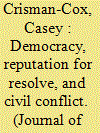| Srl | Item |
| 1 |
ID:
185190


|
|
|
|
|
| Summary/Abstract |
There is a long-running disagreement about how regime type affects a country’s ability to project resolve. Specifically, there is an open question about whether being a democracy helps or hurts a country’s reputation for resolve. I consider this question by directly estimating a state’s reputation for resolve using a unified theoretical and statistical approach. To be precise, I derive an empirical model from a dynamic game of continuous-time bargaining where each side fights in order to build a reputation for resolve. I then fit this model using data on the duration and termination of civil conflicts between 1946 and 2009. I find that while governments tend to have stronger reputations for resolve than the rebels they face, democracies are seen as much less likely to be resolved both prior to and during conflict than their autocratic counterparts. Likewise, democracies are more likely to end a conflict by making a policy change in favor of the rebels than autocracies. Despite these differences, both democracies and autocracies experience a discrete increase in their reputations for resolve once conflict begins, with democracies receiving a much larger boost. As such, these findings contrast with a large literature on democratic credibility theory, while simultaneously providing evidence consistent with some of the logic behind democratic credibility theory.
|
|
|
|
|
|
|
|
|
|
|
|
|
|
|
|
| 2 |
ID:
100391


|
|
|
|
|
| Publication |
2010.
|
| Summary/Abstract |
When are economic sanctions expected to succeed? Previous studies predict that sanctions will be more effective when the issue at stake is important, when the sender and target are allied, when the target's domestic institutions are more democratic, and when the target's economy is dependent on the sender's. This article subjects these explanations to an empirical test using a new fully structural estimation that employs a game theoretic model as a statistical model. The initiation and outcomes of sanctions are incorporated with the strategic behaviors of sender and target states into a unified model. The model improves upon extant models by allowing the initial choice of the sender states to be multiple, not binary. This non-binary option enables the sender states to opt for the optimal intensity level of sanctions. Findings suggest that issue salience is positively associated with the decision to impose sanctions, but not necessarily with their effectiveness. Further, allied targets tend to comply even when they can win a sanctions contest, while non-allied targets tend to resist even when they know that on average the sender is likely to continue sanctioning in the face of resistance. Since sanctions imposed from 1903 to 2002 take place disproportionately between non-allied dyads, and thus belong to the category of sanctions most likely to fail, we can begin to understand why sanctions have such a low success rate.
|
|
|
|
|
|
|
|
|
|
|
|
|
|
|
|